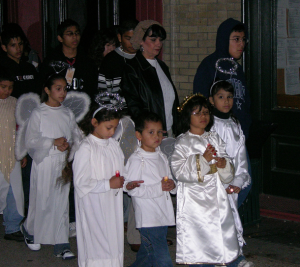Las Posadas, An Aztec Celebration
 We’re in the midst of the Posada season, and if you know what I’m talking about there’s little else for me to say —there’s no need for an explanation or to paint a picture of the traditional celebration. How we got to this celebration, though, is fascinating.
We’re in the midst of the Posada season, and if you know what I’m talking about there’s little else for me to say —there’s no need for an explanation or to paint a picture of the traditional celebration. How we got to this celebration, though, is fascinating.
I was raised Catholic (no surprise) and went to boys’ Catholic school in Nuevo Laredo, Mexico. When I was a kid Las Posadas were a big deal, a very big deal; the entire school congreagted and paraded around the school grounds. By some machination that I was not aware of, a boy from among us was made to wear a fake beard, paired with a girl from the girls’ school, dressed in Middle Eastern garb, given a swaddled baby doll to hold and a live donkey to lead. The rest of us followed, around the large soccer field mostly, singing the Posada song. It was great fun, unless you were picked to be the Joseph stand-in, in which case it was embarrassing — regardless of your name, you were called “José” for the rest of the evening, and were made the butt of all manner of donkey jokes. We were kids, and for the most part unruly.
The best part of the night was the fiesta, the party after the procession, and the sparklers and bottle rockets; the piñata was for the little kids, except for the dog-pile scramble for the candy — there are some things that are beyond propriety and have to do more with the force of nature. Sometimes we jumped into the fray for the sheer delight of it, the mothers snatched their little ones from the middle of the yard, the teachers did their best to restore order, but it was mostly for show. The Marist brothers who ran the school understood boy energy, so they sounded like they were trying to bring order to the ruckus, but the were actually making sure there would be no limbs broken or blood shed — it happened.
Most other people remember and participate in the Posadas differently. They’re mostly family or neighborly affairs, celebrated between December 16th and 24th, commemorations of the holy family’s journey to Bethlehem. But it didn’t start that way. The meso-American natives, the Aztecs to be specific, celebrated the virgin birth of their god Huitzilopochtli around the time of the winter solstice, in late December. Hogar Hispano tells the story this way:
According to legend, Huitzilopochtli’s mother, Coatlicue, was struck by a plumed ball of feathers while she was sweeping the steps of the temple, and in due course gave birth to the new god. Her other sons refused to believe the story of the supernatural conception and decided to kill her, but Huitzilopochtli appeared, armed with a fire serpent, and destroyed his scheming brothers.
The festival celebrating Huizilopochtli’s birth was the most important one of the Aztec year. It began at midnight and continued through the following day, with much singing, dancing, and speechmaking. The Indians paraded under elaborate arches of roses, wearing their finest attire adorned with brightly tinted plumes. Special foods were prepared, including small idols made of corn paste and cactus honey, and huge bonfires in courtyards and on the flat roofs of the houses lit up the sky for miles around.
The Spanish missionaries took this celebration and supplanted the Christian story over it, thus Las Podadas.
All these centuries later Las Posadas have become a full-fledged Christian celebration, a re-enactment of the holy family’s plight, seeking shelter on the eve of the Jesus’ birth (Posada is Spanish for accommodation). There’s traditional singing, an ask and response song where some people play the part of the innkeepers and others sing the part of Joseph and Mary. One side asks for lodging, the other rejects, over and over, until the final verse where doors swing open and the celebration begins.
Mexconnect.com has a good version of the song, with English translation.
If you celebrate Las Posadas, felicidades! And you have a piñata at your celebration, be patient with the boys at the candy scramble — just remember to stay out of the way.
[Photo by txbowen]
